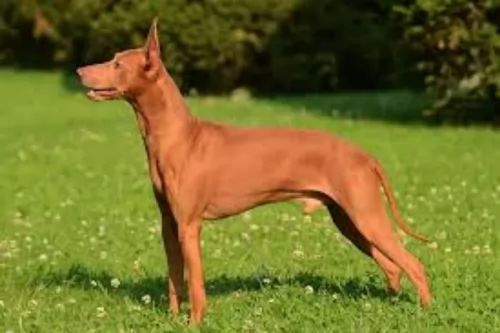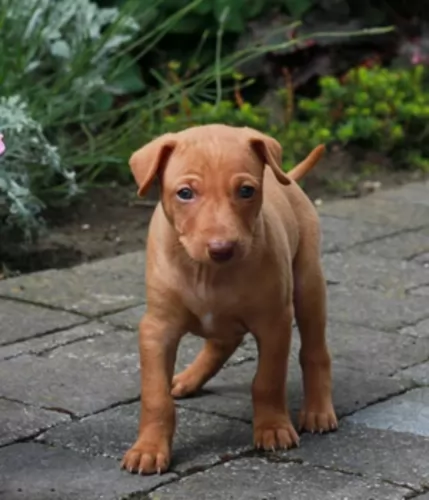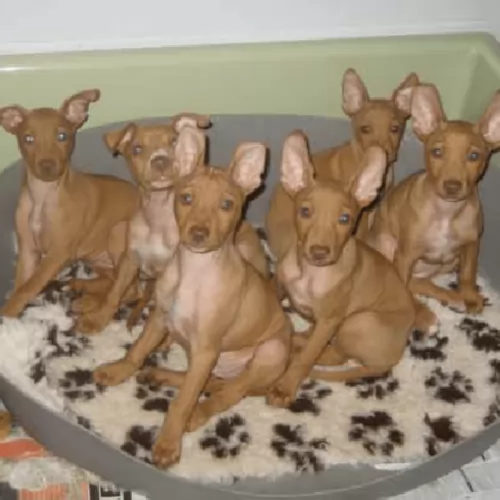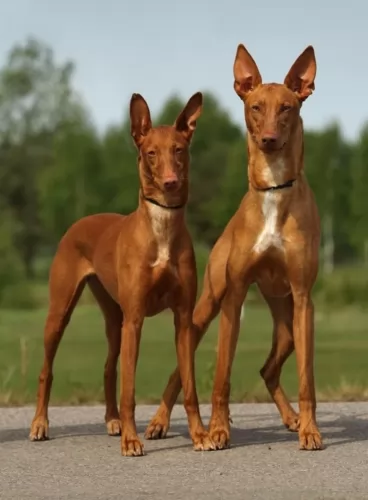 Petzlover
Petzlover Cirneco dell'Etna is originated from Italy but Polish Hound is originated from Poland. Cirneco dell'Etna may grow 13 cm / 5 inches shorter than Polish Hound. Cirneco dell'Etna may weigh 20 kg / 44 pounds lesser than Polish Hound. Both Cirneco dell'Etna and Polish Hound has almost same life span. Both Cirneco dell'Etna and Polish Hound has almost same litter size. Both Cirneco dell'Etna and Polish Hound requires Moderate Maintenance.
Cirneco dell'Etna is originated from Italy but Polish Hound is originated from Poland. Cirneco dell'Etna may grow 13 cm / 5 inches shorter than Polish Hound. Cirneco dell'Etna may weigh 20 kg / 44 pounds lesser than Polish Hound. Both Cirneco dell'Etna and Polish Hound has almost same life span. Both Cirneco dell'Etna and Polish Hound has almost same litter size. Both Cirneco dell'Etna and Polish Hound requires Moderate Maintenance.
 The Cirneco dell’Etna comes from the island of Sicily and not mainland Italy, although it is considered an Italian dog. It is a small dog that hunted rabbits and its calling card was its ability to go for hours without water or food. They have terrific endurance and a good sense of smell. They were developed for the harsh terrain they worked around places like Mount Etna. Of all the Mediterranean island hunting dogs, the Cirneco de’Etna is the smallest.
The Cirneco dell’Etna comes from the island of Sicily and not mainland Italy, although it is considered an Italian dog. It is a small dog that hunted rabbits and its calling card was its ability to go for hours without water or food. They have terrific endurance and a good sense of smell. They were developed for the harsh terrain they worked around places like Mount Etna. Of all the Mediterranean island hunting dogs, the Cirneco de’Etna is the smallest.
This is a very ancient breed, surviving on its hunting skills alone for thousands of years on Sicily. They then became guard dogs for the peasants. Because they had such speed, sense of smell, alertness and sight, they were great hunters.
Today’s Cirneco de’Etna is highly competitive in confirmation and make terrific pets. They are exceedingly friendly, energetic and low maintenance. Lure coursing is what they really excel at. They are good at agility and pursuit games as well.
 It is thought that Polish Hounds descended from the Kostroma Hound. Other experts believe that the dogs were developed through crossbreeding of Bloodhounds with local Polish hounds.
It is thought that Polish Hounds descended from the Kostroma Hound. Other experts believe that the dogs were developed through crossbreeding of Bloodhounds with local Polish hounds.
The idea was to get a more lighter-boned, more athletic Bloodhound type of dog. In fact, this new standard was adopted in 1983 as the guide for the ideal Polish Hound.
The World Wars caused the numbers of these dogs to be drastically reduced, and attempts were made to revive the breed. The dog is rare outside his native country.
 The Cirneco de’Etna is a sleek, muscular sighthound. His ears are close together and high on his head. The head is lean, and the skull is almost flat in profile. The muzzle is about the same length as the skull and the nose is large and its coloring matches the dog’s coat. They have hard pads the same color as their nails, but they are never black.
The Cirneco de’Etna is a sleek, muscular sighthound. His ears are close together and high on his head. The head is lean, and the skull is almost flat in profile. The muzzle is about the same length as the skull and the nose is large and its coloring matches the dog’s coat. They have hard pads the same color as their nails, but they are never black.
 The Polish Hound is a nice, big, solid looking dog. He stands at between 55–65 cm in height and weighs between 20 to 32kg, both male and female. If you were to try and think of him, you could think of a Labrador/Beagle/Bloodhound mix.
The Polish Hound is a nice, big, solid looking dog. He stands at between 55–65 cm in height and weighs between 20 to 32kg, both male and female. If you were to try and think of him, you could think of a Labrador/Beagle/Bloodhound mix.
He is a medium to large sized dog. The coat is short to medium in length and is thick and hard with a soft, dense undercoat. The color of the coat is brown and tan and black and tan. The dog’s tail is set low and is thick and long.
This dog is a wonderful dog known to be clever and eager to please. He also has other attractive characteristics such as being energetic, gentle and he has an urge to protect his human family.
He is also loved because he is reliable and gentle around children who know how to treat dogs with respect. Some people who have owed this dog say that there is just one small fault – the dog’s bark – it is deep and mellow – and its why he isn’t suited to life in the city.
He is a rural dog, loving wide open spaces. It is why the dog will be an excellent pet if he is trained and socialized, becoming obedient and well balanced.
 As a family pet, the Polish Hound just loves his human family, particularly when they are outdoor, active types. Your Polish Hound just loves spending time with his human family.
As a family pet, the Polish Hound just loves his human family, particularly when they are outdoor, active types. Your Polish Hound just loves spending time with his human family.
This is a wonderful dog as a family pet. More so when he has been trained and socialized. In exchange for the the wonderful companionship this dog offers you, you owe it to him to keep him happy and content.
 Like many dogs that come from ancient breeds with little cross breeding over the years, there are not a lot of inherited issues for the Cirneco de’Etna. Also, there are so few dogs remaining that little is known about their health in general and there are no studies to go on. Some breeders will do test despite the fact that none are recommended.
Like many dogs that come from ancient breeds with little cross breeding over the years, there are not a lot of inherited issues for the Cirneco de’Etna. Also, there are so few dogs remaining that little is known about their health in general and there are no studies to go on. Some breeders will do test despite the fact that none are recommended.
Their most common health issues are acquired such as injuries from running or competitions and obesity. Both can be controlled by the owner.
 The Polish Hound has a reputation for good health. That doesn’t mean you can just leave your pet. Good preventative healthcare is still vital if you want to prevent your pet being attacked by fleas, ticks, worms and mosquitoes.
The Polish Hound has a reputation for good health. That doesn’t mean you can just leave your pet. Good preventative healthcare is still vital if you want to prevent your pet being attacked by fleas, ticks, worms and mosquitoes.
You need to be careful with the Polish Hound because it's a deep chested dog, and these kinds of dogs are more prone to bloat. This is a deadly disease when the stomach twists and gas can’t escape. Untreated, bloat can be a killer. Take immediate action when you see your dog with a swollen stomach, restlessness and drooling.
 The Cirneco needs a good quality food since they are such high energy dogs. Be careful not to overfeed them so that they become obese.
The Cirneco needs a good quality food since they are such high energy dogs. Be careful not to overfeed them so that they become obese.
As previously mentioned, the main concern for owners is injuries acquired while on a running course or in the activities of daily living. They have been known to hurt their feet. They need their ears checked regularly for any signs of infection or irritation. Clean out any excess water or dirt.
This is an intelligent, hardy breed that needs mental and physical stimulation. They need a job, or they can be a major problem. They love hunting of course but also excel at agility, lure crossing, and competition. He is loyal and loves being with people. Take him for long walks but don’t let him off the leash.
 As a working dog, the Polish Hound is used to being busy and will be relying on you for a good dose of exercise. He loves the chance of a walk or a run and will be happy to run alongside you while you cycle or jog. Don’t forget ball games too.
As a working dog, the Polish Hound is used to being busy and will be relying on you for a good dose of exercise. He loves the chance of a walk or a run and will be happy to run alongside you while you cycle or jog. Don’t forget ball games too.
The thick coat of the dog will need to be brushed twice a week to remove all that loose hairs. He is a moderate shedder so the coat becomes dull if not regularly brushed.
During the brushing session, check your dog over for fleas and ticks, and any odd lumps that weren’t there before. Trim your pets nails if they don’t wear down naturally. This is a floppy eared breed, so you will need to check the inside of his ears for dirt, wax and bacteria.
Pay close attention to your dog’s teeth.Bad teeth can cause a lot of pain but also be very detrimental to your dog’s health.
Just like humans, dogs rely on quality food for good health and longevity. There are many good commercially manufactured dog foods, but avoid the ones with low quality ingredients as these can make your dog ill.
Check the ingredients-list carefully so that you can be sure your pet is getting the right balances of vitamins and minerals. Home-made food is also important as it is nutritious and tasty. You can add it into the dry kibble as a treat sometimes. The simpler the better as dogs don’t like spicy, exotic foods.
Boiled chicken, brown rice or pasta, sweet potatoes, spinach and carrot can be chopped up and given to your pet. Also try and include some raw meat as this is beneficial for health. Fresh, cool water must be made constantly available.